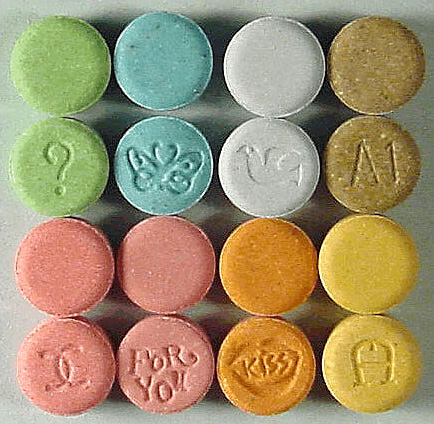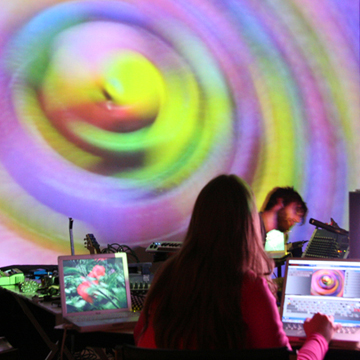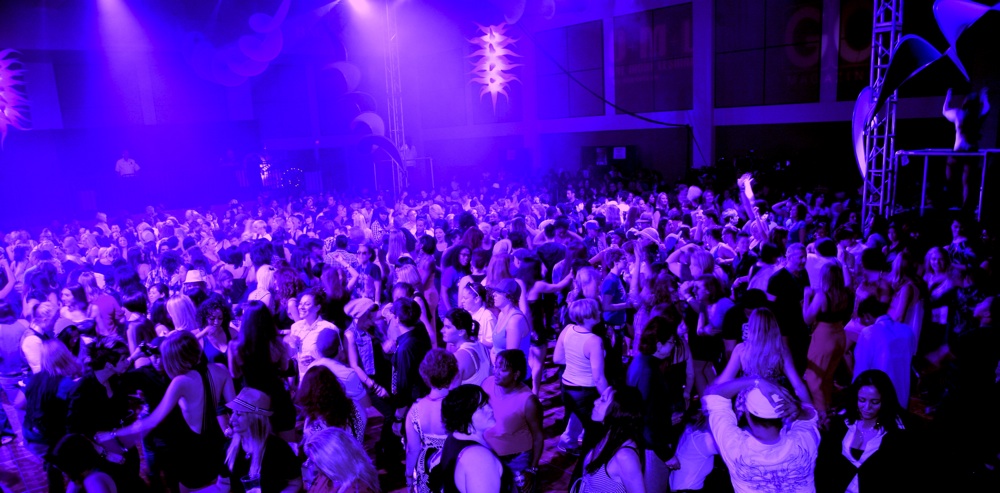|
Rave
A rave (from the verb: '' to rave'') is a dance party at a warehouse, club, or other public or private venue, typically featuring performances by DJs playing electronic dance music. The style is most associated with the early 1990s dance music scene when DJs played at illegal events in musical styles dominated by electronic dance music from a wide range of sub-genres, including techno, hardcore, house, and alternative dance. Occasionally live musicians have been known to perform at raves, in addition to other types of performance artists such as go-go dancers and fire dancers. The music is amplified with a large, powerful sound reinforcement system, typically with large subwoofers to produce a deep bass sound. The music is often accompanied by laser light shows, projected coloured images, visual effects and fog machines. While some raves may be small parties held at nightclubs or private homes, some raves have grown to immense size, such as the large festivals and ... [...More Info...] [...Related Items...] OR: [Wikipedia] [Google] [Baidu] |
Algorave
An algorave (from an algorithm and rave) is an event where people dance to music generated from algorithms, often using live coding techniques. Alex McLean of Slub and Nick Collins coined the word "algorave" in 2011, and the first event under such a name was organised in London, UK. It has since become a movement, with algoraves taking place around the world. Description Algoraves can include a range of styles, including a complex form of minimal techno, and the movement has been described as a meeting point of hacker philosophy, geek culture, and clubbing. Although live coding is commonplace, any algorithmic music is welcome which is "wholly or predominantly characterised by the emission of a succession of repetitive conditionals", which is a corruption of the definition of rave music (“wholly or predominantly characterised by the emission of a succession of repetitive beats”) in the UK's Criminal Justice Act. Although algorave musicians have been compared with DJs, they ar ... [...More Info...] [...Related Items...] OR: [Wikipedia] [Google] [Baidu] |
Free Party
A free party is a party "free" from the restrictions of the legal club scene, similar to the free festival movement. It typically involves a sound system playing electronic dance music from late at night until the time when the organisers decide to go home. A free party can be composed of just one system or of many and if the party becomes a festival, it becomes a teknival. This typically means that drugs are readily available. The word ''free'' in this context is used both to describe the entry fee and the lack of restrictions and law enforcement. Motivations for organisers range from political protest to simply wanting to have fun. An example of free parties as political protest was their prominence during the M11 link road protest. At most parties no money is asked for entrance since the aim is not to make profit. However, at some (most often indoor) events it is requested at the door to make a donation to cover costs. Typically organisers make little profit or make a l ... [...More Info...] [...Related Items...] OR: [Wikipedia] [Google] [Baidu] |
Teknival
Teknivals (the word is a portmanteau of the words tekno and festival) are large free parties which take place for several days. They take place most often in Europe and are often illegal under various national or regional laws. They vary in size from dozens to thousands of people, depending on factors such as accessibility, reputation, weather, and law enforcement. The parties often take place in venues far away from residential areas such as squatted warehouses, empty military bases, beaches, forests or fields. The teknival phenomenon is a grassroots movement which has grown out of the rave, punk, reggae sound system and UK traveller scenes and spawned an entire subculture. Summer is the usual season for teknivals. History Teknivals are a larger scale version of free parties and emerged in the early 1990s, when acid house parties and travellers in Great Britain became the target of political repression, culminating in the Criminal Justice and Public Order Act 1994. Sectio ... [...More Info...] [...Related Items...] OR: [Wikipedia] [Google] [Baidu] |
Techno
Techno is a Music genre, genre of electronic dance music (EDM) which is generally music production, produced for use in a continuous DJ set, with tempo often varying between 120 and 150 beats per minute (bpm). The central Drum beat, rhythm is typically in common time (4/4) and often characterized by a repetitive four on the floor (music), four on the floor beat. Artists may use electronic instruments such as drum machines, sequencer (musical instrument), sequencers, and synthesizers, as well as digital audio workstations. Drum machines from the 1980s such as Roland Corporation, Roland's TR-808 and TR-909 are highly prized, and softsynth, software emulations of such retro instruments are popular. Much of the instrumentation in techno emphasizes the role of rhythm over other musical parameters. Techno tracks mainly progress over manipulation of timbre, timbral characteristics of synthesizer presets and, unlike forms of EDM that tend to be produced with synthesizer keyboards, techno ... [...More Info...] [...Related Items...] OR: [Wikipedia] [Google] [Baidu] |
Club Drug
Club drugs, also called rave drugs or party drugs, are a loosely defined category of recreational drugs which are associated with discothèques in the 1970s and nightclubs, dance clubs, electronic dance music (EDM) parties, and raves in the 1980s to today. Unlike many other categories, such as opiates and benzodiazepines, which are established according to pharmaceutical or chemical properties, club drugs are a "category of convenience", in which drugs are included due to the locations they are consumed and/or where the user goes while under the influence of the drugs. Club drugs are generally used by adolescents and young adults. This group of drugs is also called "designer drugs", as most are synthesized in a chemical lab (e.g., MDMA, ketamine, LSD) rather than being sourced from plants (as with marijuana, which comes from the cannabis plant) or opiates (which are naturally derived from the opium poppy). Club drugs range from entactogens such as MDMA ("ecstasy"), 2C-B ("nexus" ... [...More Info...] [...Related Items...] OR: [Wikipedia] [Google] [Baidu] |
Acid House
Acid house (also simply known as just "acid") is a subgenre of house music developed around the mid-1980s by DJs from Chicago. The style is defined primarily by the squelching sounds and basslines of the Roland TB-303 electronic bass synthesizer-sequencer, an innovation attributed to Chicago producers DJ Pierre of Phuture and Sleezy D. Acid house soon became popular in the United Kingdom and continental Europe, where it was played by DJs in the acid house and later rave scenes. By the late 1980s, acid house had moved into the British mainstream, where it had some influence on pop and dance styles. Acid house brought house music to a worldwide audience. The influence of acid house can be heard in later styles of dance music including trance, hardcore, jungle, big beat, techno and trip hop. Characteristics Acid house's minimalist sound combined house music's ubiquitous programmed four-on-the-floor 4/4 beat with the electronic squelch sound produced by the Roland TB-303 ... [...More Info...] [...Related Items...] OR: [Wikipedia] [Google] [Baidu] |
VJing
VJing (pronounced: ''VEE-JAY-ing'') is a broad designation for realtime visual performance. Characteristics of VJing are the creation or manipulation of imagery in realtime through technological mediation and for an audience, in synchronization to music. VJing often takes place at events such as concerts, nightclubs, music festivals and sometimes in combination with other performative arts. This results in a live multimedia performance that can include music, actors and dancers. The term VJing became popular in its association with MTV's Video Jockey but its origins date back to the New York club scene of the 70s. In both situations VJing is the manipulation or selection of visuals, the same way DJing is a selection and manipulation of audio. One of the key elements in the practice of VJing is the realtime mix of content from a "library of media", on storage media such as VHS tapes or DVDs, video and still image files on computer hard drives, live camera input, or from compu ... [...More Info...] [...Related Items...] OR: [Wikipedia] [Google] [Baidu] |
Circuit Party
A circuit party is a large dance event. It extends through the night and into the following day, almost always with a number of affiliated events in the days leading up to and following the main event. Proto-circuit parties in the late 1970s, the precursors of what later became circuit parties, were called disco parties. They lasted only one evening and were held in various large venues in metropolitan areas with large gay populations. Circuit parties were first developed in connection with the early tea dances, attended by a subset of gay men, as well as theme parties held on Fire Island, in the days before the beginning of the health crisis of HIV/AIDS. They came to resemble underground rave parties in some respects, but differ in that circuit parties are highly publicized and professionally produced, and tend to attract people from a wider age range and a broader geographic area. Background Founding as disco parties (1970s) The start of the circuit has been attributed t ... [...More Info...] [...Related Items...] OR: [Wikipedia] [Google] [Baidu] |
Nightclub
A nightclub (music club, discothèque, disco club, or simply club) is an entertainment venue during nighttime comprising a dance floor, lightshow, and a stage for live music or a disc jockey (DJ) who plays recorded music. Nightclubs generally restrict access to people in terms of age, attire, personal belongings, and inappropriate behaviors. Nightclubs typically have dress codes to prohibit people wearing informal, indecent, offensive, or gang-related attire from entering. Unlike other entertainment venues, nightclubs are more likely to use bouncers to screen prospective patrons for entry. The busiest nights for a nightclub are Friday and Saturday nights. Most nightclubs cater to a particular music genre or sound for branding effects. Some nightclubs may offer food and beverages (including alcoholic beverages). History Early history In the United States, New York increasingly became the national capital for tourism and entertainment. Grand hotels were built for upsc ... [...More Info...] [...Related Items...] OR: [Wikipedia] [Google] [Baidu] |
MDMA
3,4-Methylenedioxymethamphetamine (MDMA), commonly seen in tablet form (ecstasy) and crystal form (molly or mandy), is a potent empathogen–entactogen with stimulant properties primarily used for recreational purposes. The desired effects include altered sensations, increased energy, empathy, and pleasure. When taken by mouth, effects begin in 30 to 45 minutes and last 3 to 6 hours. MDMA was first developed in 1912 by Merck. It was used to enhance psychotherapy beginning in the 1970s and became popular as a street drug in the 1980s. MDMA is commonly associated with dance parties, raves, and electronic dance music. It may be mixed with other substances such as ephedrine, amphetamine, and methamphetamine. In 2016, about 21 million people between the ages of 15 and 64 used ecstasy (0.3% of the world population). This was broadly similar to the percentage of people who use cocaine or amphetamines, but lower than for cannabis or opioids. In the United Stat ... [...More Info...] [...Related Items...] OR: [Wikipedia] [Google] [Baidu] |
Acid House Party
An acid house party was a type of illegal party typically staged in abandoned warehouses between 1987 and 1989. Parties played acid house and acid techno music, electronic music genres with a distinct sound from the use of the Roland TB-303 synthesizer. The origin of the term acid house party is disputed coming either from the 1987 song "Acid Trax" by Phuture, or the consumption of MDMA and LSD that were common at the parties. Setting Events and parties were often held in empty warehouses across the UK and were essentially illegal. Some of the most famous party promoters included Energy, Biology, Genesis'88, Sunrise, and Weekend World. Emerging from Danny Rampling's London club Shoom in late 1987, parties grew in northern cities like Manchester (the Madchester scene) where warehouses had closed throughout the 1970s, and up to 10,000 people attended parties in smaller places such as Blackburn. Vague flyers around towns advertised events and information travelled by word of mouth ... [...More Info...] [...Related Items...] OR: [Wikipedia] [Google] [Baidu] |
Nature
Nature, in the broadest sense, is the physical world or universe. "Nature" can refer to the phenomena of the physical world, and also to life in general. The study of nature is a large, if not the only, part of science. Although humans are part of nature, human activity is often understood as a separate category from other natural phenomena. The word ''nature'' is borrowed from the Old French ''nature'' and is derived from the Latin word ''natura'', or "essential qualities, innate disposition", and in ancient times, literally meant "birth". In ancient philosophy, ''natura'' is mostly used as the Latin translation of the Greek word ''physis'' (φύσις), which originally related to the intrinsic characteristics of plants, animals, and other features of the world to develop of their own accord. The concept of nature as a whole, the physical universe, is one of several expansions of the original notion; it began with certain core applications of the word φύσις by pre-S ... [...More Info...] [...Related Items...] OR: [Wikipedia] [Google] [Baidu] |






.jpg)
.jpg)